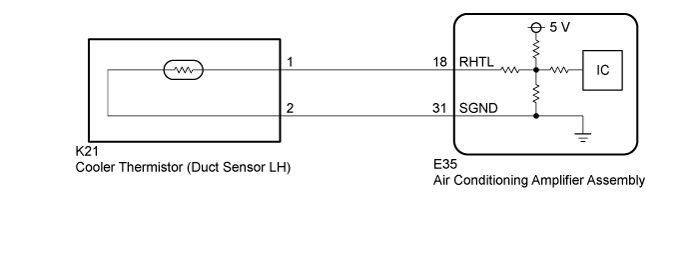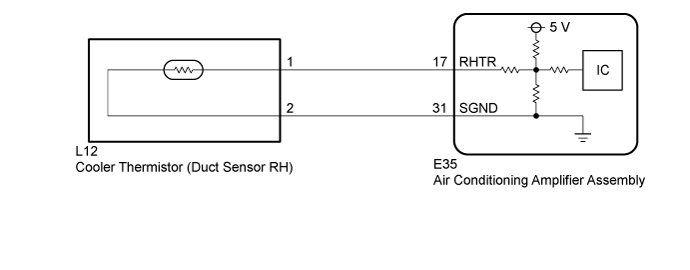Dtc B1467/67 Rear Air Foot Duct Sensor Circuit On Driver Side
DESCRIPTION
WIRING DIAGRAM
INSPECTION PROCEDURE
READ VALUE USING GTS (FOOT DUCT SENSOR [REAR D])
CHECK COOLER THERMISTOR (DUCT SENSOR [for Driver Side])
CHECK HARNESS AND CONNECTOR (COOLER THERMISTOR [DUCT SENSOR] - AIR CONDITIONING AMPLIFIER ASSEMBLY)
DTC B1467/67 Rear Air Foot Duct Sensor Circuit on Driver Side |
DESCRIPTION
- *1: for LHD
- *2: for RHD
The cooler thermistor (duct sensor LH*1 or RH*2) detects the duct temperature and sends the appropriate signals to the air conditioning amplifier assembly.DTC Code
| DTC Detection Condition
| Trouble Area
|
B1467/67
| An open or short in the air duct temperature sensor LH*1 or RH*2 circuit.
| - Cooler thermistor (duct sensor LH)*1
- Cooler thermistor (duct sensor RH)*2
- Harness or connector
- Air conditioning amplifier assembly
|
WIRING DIAGRAM
INSPECTION PROCEDURE
| 1.READ VALUE USING GTS (FOOT DUCT SENSOR [REAR D]) |
- *1: for LHD
- *2: for RHD
Use the Data List to check if the cooler thermistor (duct sensor LH*1 or RH*2) is functioning properly (Click here).
Air ConditionerTester Display
| Measurement Item/Range
| Normal Condition
| Diagnostic Note
|
Foot Duct Sensor (Rear D)
| Cooler thermistor (duct sensor LH*1 or RH*2) / Min.: -12.7°C (9.14°F), Max.: 76.55°C (169.79°F)
| Cooler thermistor (duct sensor LH*1 or RH*2) displayed
| Cooler thermistor (duct sensor LH*1 or RH*2) system malfunction:
- Open in the circuit: -12.7°C (9.14°F)
- Short in the circuit: 76.55°C (169.79°F)
|
- OK:
- The display is as specified in the normal condition.
| OK |
|
|
|
| REPLACE AIR CONDITIONING AMPLIFIER ASSEMBLY (Click here) |
|
| 2.CHECK COOLER THERMISTOR (DUCT SENSOR [for Driver Side]) |
Remove the cooler thermistor (duct sensor LH*1 or RH*2) (Click here).
Inspect the cooler thermistor (duct sensor LH*1 or RH*2) (Click here)
| | REPLACE COOLER THERMISTOR (DUCT SENSOR) (for Driver Side) (Click here) |
|
|
| 3.CHECK HARNESS AND CONNECTOR (COOLER THERMISTOR [DUCT SENSOR] - AIR CONDITIONING AMPLIFIER ASSEMBLY) |
for LHD:
Disconnect the K21 cooler thermistor (duct sensor LH) connector.
Disconnect the E35 air conditioning amplifier assembly connector.
Measure the resistance according to the value(s) in the table below.
- Standard Resistance:
Tester Connection
| Condition
| Specified Condition
|
E35-18 (RHTL) - K21-1
| Always
| Below 1 Ω
|
E35-31 (SGND) - K21-2
| Always
| Below 1 Ω
|
E35-18 (RHTL) - E35-31 (SGND)
| Always
| 10 kΩ or higher
|
E35-18 (RHTL) or K21-1 - Body ground
| Always
| 10 kΩ or higher
|
E35-31 (SGND) or K21-2 - Body ground
| Always
| 10 kΩ or higher
|
for RHD:
Disconnect the L12 cooler thermistor (duct sensor RH) connector.
Disconnect the E35 air conditioning amplifier assembly connector.
Measure the resistance according to the value(s) in the table below.
- Standard Resistance:
Tester Connection
| Condition
| Specified Condition
|
E35-17 (RHTR) - L12-1
| Always
| Below 1 Ω
|
E35-31 (SGND) - L12-2
| Always
| Below 1 Ω
|
E35-17 (RHTR) - E35-31 (SGND)
| Always
| 10 kΩ or higher
|
E35-17 (RHTR) or L12-1 - Body ground
| Always
| 10 kΩ or higher
|
E35-31 (SGND) or L12-2 - Body ground
| Always
| 10 kΩ or higher
|
| | REPAIR OR REPLACE HARNESS OR CONNECTOR |
|
|
| OK |
|
|
|
| REPLACE AIR CONDITIONING AMPLIFIER ASSEMBLY (Click here) |
|

